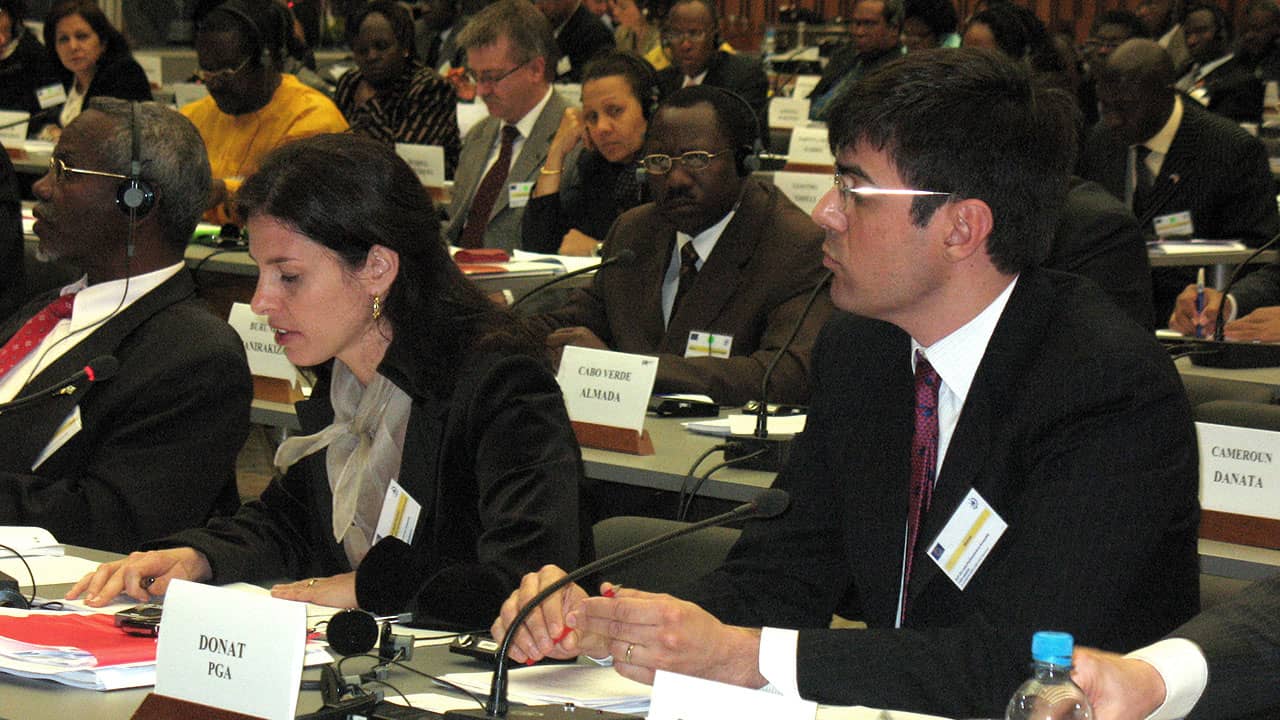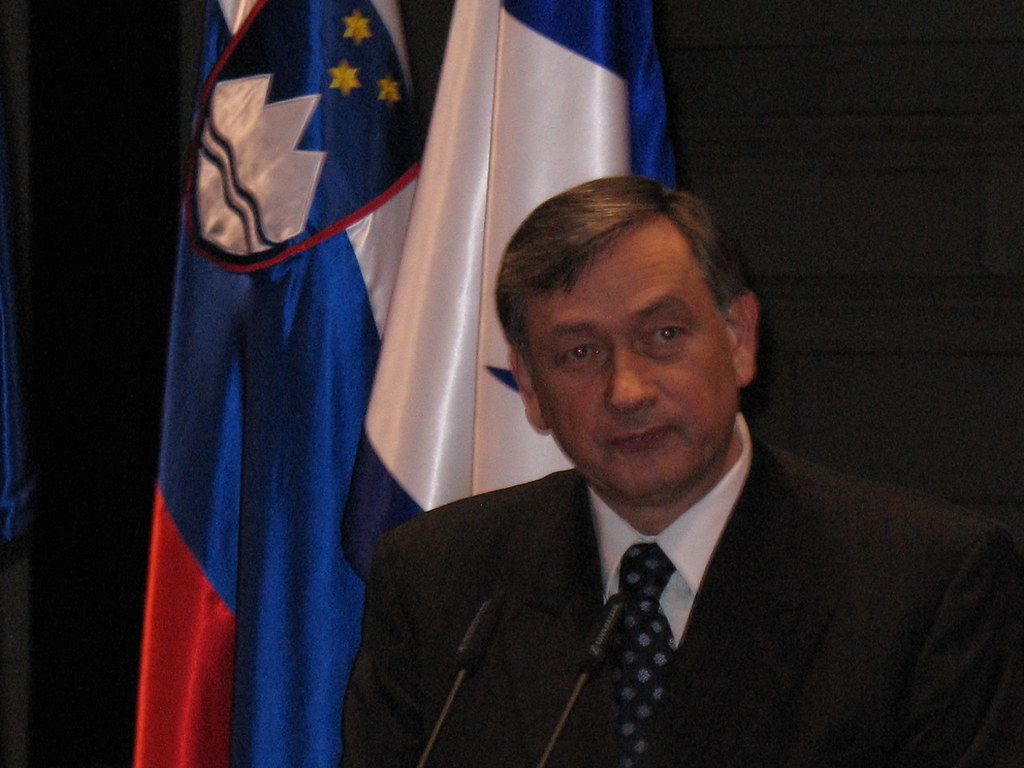
Summary of the Proceedings
An important discussion on the International Criminal Court (ICC) was held on 17 March 2008 at the 15th session of the Africa-Caribbean-Pacific—European Union Joint Parliamentary Assembly (ACP-EU JAP), which took place in Ljubljana, Slovenia. A spirited debate re-launched the political commitment in support of the universality and effectiveness of the new system of international criminal justice within the North-South cooperation framework of the ACP-EU, the only one equipped with a treaty-based parliamentary body.
The inclusion of the ICC in the agenda was made possible thanks to the initiative and efforts of PGA member Mr. Jo Leinen, Member of the European Parliament (MEP) (Germany, Chair of the Constitutional Affairs Committee).
The debate was opened by a presentation of the ICC Office of the Prosecutor’s cooperation adviser, Dr. Olivia Swaak-Goldman on the current activities and challenges faced by the ICC, and by a statement on behalf of civil society delivered by PGA’s Director of Programs, Dr. David Donat Cattin, who congratulated the Madagascar delegation for becoming the 106th State Party and called parliamentarians to “end the vicious circle of impunity and violence” reaffirming the fundamental role played by them in enhancing the ICC’s contribution to peace and security.
During the debate, Lawmakers from Africa, the Caribbean, Europe and the Pacific expressed their firm commitment to ratify or accede to the Rome Statute, and to adopt implementing legislation.
Mr. Jo Leinen MEP (PSE, Germany, PGA member), stressed the preventative role of the ICC and called on the participants in Ljubljana to do their homework and adhere to the commitments sought in the Brazzaville Resolution on the ICC of the ACP-EU JAP, which were incorporated in Article 11.6 of the Revised Cotonou Agreement that urges all ACP and EU countries to ratify the Rome Statute.
In the same vein, Dep. Emmanuel Mbiam (Cameroon - PGA Member), announced that Cameroon is working to remove procedural obstacles so as to be able to ratify the Rome Statute soon. Hon. Bernadette Lahai, MP (Sierra Leone) re-stated the commitment of PGA’s National Group to ensure that the ICC implementation bill is promptly transmitted to Parliament by the Executive, so that it could receive multi-party support, thus attesting the legacy that justice has had in guaranteeing durable peace in Sierra Leone.
Mr. Hans-Peter Mayer MEP (PPE, Germany) recalled the long-standing support of the European Union for the ICC and the fight against impunity for the most serious crimes of international concern, for which impunity can no more be tolerated.
On the threat that impunity poses to international peace and security and the contribution of the Court to stability and the Rule of Law, Mr. Nirj Deva MEP (UK-Conservative) rebutted the position of Mr. Atem Garang Dekuek MP (Deputy President of the National Assembly of Sudan), who questioned the role of the ICC in the Northern Uganda conflict and the Juba peace talks. Mr. Deva stated that it would be unacceptable for the International Community to follow the strategy of Nuremberg, awaiting the end of the conflict to seek for justice, and recalled the progress made by the global movement for human rights over the past 60 years, since the UN Universal Declaration of Human Rights and the Genocide Convention were adopted. The British MEP effectively proved that if justice was sidelined, the Rule of Law would become a mockery, and the commission of criminal acts would be legitimised: This would be an unacceptable state of affairs in any national Rule of Law system. He concluded his speech by urging the US to ratify the Rome Statute, in line with the tradition of a rights-based democracy.
In a related debate with EU Commissioner for Development Mr. Louis Michel held on 18 March, Ms. Amon (First Vice-president of the National Assembly of Cote d’Ivoire), stressed the same concept, but within the framework of the paradoxical situation in which victims of conflict and atrocities are left out, when they see that the perpetrators of such atrocities are invited to negotiate and participate in power-sharing agreements, through which they are rewarded with high level Government positions while their troops receive funding and other support within the framework of Disarmament, Demobilisation and Recovery (DDR) programmes. Conversely, victims of atrocities are too often left behind, with no access to justice and reparations, no support from society and Government, and the only option to take justice and revenge within their own hands.
Hon. Sir Louis Straker MP (Deputy Prime Minister and Minister of Foreign Affairs of St. Vincent and The Grenadines, PGA member), underscored the courageous position of several states in the Caribbean and in Africa to resist the pressure of the United States to sign bilateral agreements against their international obligations, and called for a renewed, consistent solidarity of the EU, which was unable to meet some of the requests formulated by the ACP-EU JAP in previous Resolutions. Ms. Ana Gomes MEP (Portugal, PPE) expressed the full support of the European Parliament for the position of these States that protected the integrity of the Rome Statute and posed a question to the European Commission concerning what the EC is doing to promote the enforcement of the Arrest Warrants issued by the ICC. Mr. Miguel Angel Martínez Martínez MEP (Spain, PPE, Vice-president of the European Parliament) reiterated the unacceptability of gross violations of international humanitarian law and human rights in today’s conflicts and the responsibility of all State to prosecute such atrocities, especially when committed by their nationals.
In building on the statement made by the Co-President of the ACP-EU, Ms. Glennys Kinnock, MEP, on the role of Parliamentarians to promote peace, Hon. Assarid ag Imbarcaouane (2nd Vice-president of the National Assembly of Mali) made a call for Parliamentarians and the ICC to work closer to disseminate the mission and activities of the Court and the impact it has in building peace.
Lastly, Dip. Manuel Jimenez (Dominican Republic) shared how becoming the 99th State Party to the ICC has provided his country with opportunities for the legal regime of the ICC to have beneficial spill over effects on law-reform and the strengthening of democratic institutions. In this spirit, he extended an invitation to all participating MPs to join and support the Rome Statute system and to attend the V Consultative Assembly of Parliamentarians for the ICC & the Rule of Law, which will be organised by PGA and the Dominican Rep. Parliament in Santo Domingo on 30-31 October 2008.
The PGA network hopes that this debate will lead soon to a renewed contribution of the ACP-EU bloc to the ICC through a new resolution: most importantly, that 35 ACP-EU countries that have not yet joined the Rome Statute do so promptly, to ensure the universality and effectiveness of the ICC.
About the ACP-EU Joint Parliamentary Assembly
Since 2000, 78 parliamentarians of the European Community and parliamentarians from the 78 African, Caribbean and Pacific states ("ACP countries") that ratified the Cotonou Agreement (2000) meet twice per year in a Joint Assembly to discuss issues relating to the relationship North-South, including trade and development, as well political dimensions including the promotion of human rights and democracy, and the common values of humanity.
The ACP-EU Joint Parliamentary Assembly has been, since the establishment of the International Criminal Court, a forum for political support to the recognition of the important development for peace and international justice. This is reflected in the 2003 ACP-EU JAP Resolution adopted in Brazzaville, where the JAP reaffirmed its rejection to bilateral non-surrender agreements and invited all its members to ratify the Rome Statute.
The 2005 revision of the Cotonou Agreement saw the preambular inclusion of the establishment of the International Criminal Court as an important development for peace and international justice, and the reaffirmation “that the most serious crimes of concern to the international community must not go unpunished and that their effective prosecution must be ensured by taking measures at national level and by enhancing global collaboration”.
Additionally, with Article 11 on peace-building policies, conflict prevention and resolution, the parties to the agreement reaffirm their determination to “seek to take steps towards ratifying and implementing the Rome Statute and related instruments”.


